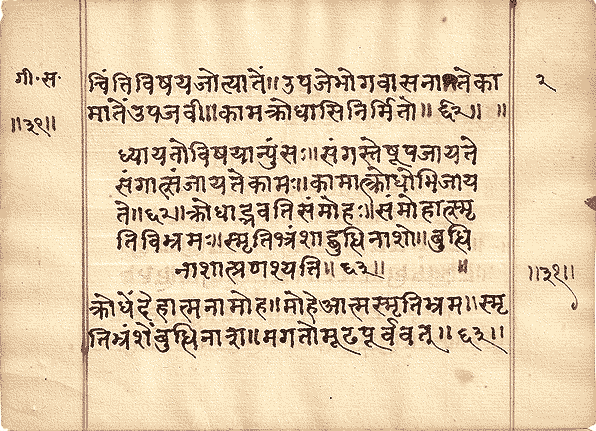
dhyāyato viṣayān puṃsaḥ saṅgas teṣūpajāyate
saṅgāt saṃjāyate kāmaḥ kāmāt krodho ‘bhijāyate
Update RequiredTo play the media you will need to either update your browser to a recent version or update your Flash plugin.
viṣayān (sense objects) dhyāyataḥ (of one who is contemplating) puṁsaḥ (of a person)
teṣu (to them) [
viṣayeṣu]
(to objects) saṅgaḥ (attachment) upajāyate (it arises),
saṅgāt (from attachment) kāmaḥ (desire) saṁjāyate (it arises together),
kāmāt (from desire) krodhaḥ (anger) abhijāyate (it arises).
| dhyāyataḥ |
– |
dhyāyant (√dhyai – to think) PPr 6n.1 m. – of one who is contemplating; |
| viṣayān |
– |
viṣaya 2n.3 m. – spheres, territories, scopes, sense objects, subjects (from: √viṣ – to be active, to perform); |
| puṁsaḥ |
– |
puṁs (pumān) 6n.1 m. – of a person; |
| saṅgaḥ |
– |
saṅga 1n.1m. – clinging, contact, relation, desire, attachment (from: sam-√gam – come together or √sañj – to attach, to stick, to embrace); |
| teṣu |
– |
tat sn. 7n.3 m. – in them; |
| upajāyate |
– |
upa-√jan (to be born, to arise) Praes. Ā 1v.1 – it arises; |
| saṅgāt |
– |
saṅga 5n.1m. – from clinging, contact, relation, desire, attachment (from: sam-√gam – come together or √sañj – to attach, to stick, to embrace); |
| saṁjāyate |
– |
sam-√jan (to be born together) Praes. Ā 1v.1 – it arises together; |
| kāmaḥ |
– |
kāma 1n.1 m. – wish, desire, pleasure (from: √kam –to wish, to love, to long for); |
| kāmāt |
– |
kāma 5n.1 m. – from wish, desire, pleasure (from: √kam – to wish, to love, to long for); |
| krodhaḥ |
– |
krodha 1n.1 m. – anger, wrath (from: √krudh – to be angry); |
| abhijāyate |
– |
abhi-√jan (to be born, to arise) Praes. Ā 1v.1 – it arises; |
saṅgas teṣūpajāyate → saṅgas teṣv abhijāyate / saṅgas teṣv apajāyate (attachment to them is born);
krodho ‘bhijāyate → krodho ‘pi jāyate (moreover anger arises);
The key:
an excerpt from the commented verse
quotes from the scriptures
starting polemic
|
Thought of sense -objects is the source of evil.
Now the Lord proceeds to point out the source of all evil in the case of the unsuccessful:
|
|
athedānīṃ parābhaviṣyataḥ sarvānartha-mūlam idam ucyate – |
|
When a man thinks of objects, attachment for them arises.
From attachment arises desire; from desire arises wrath.
|
|
dhyāyato viṣayān puṃsaḥ saṅgas teṣūpajāyate |
saṅgāt saṃjāyate kāmaḥ kāmāt krodho’bhijāyate ||2.62|| |
|
Attachment for objects arises when a man thinks of them specifically – Wrath arises when desire is frustrated by some cause or other,
|
|
dhyāyataś cintayato viṣayān śabdādīn viṣaya-viśeṣān ālocayataḥ puṃsaḥ puruṣasya saṅgaḥ āsaktiḥ prītis teṣu viṣayeṣu upajāyate utpadyate | saṅgāt prīteḥ saṃjāyate samutpadyate kāmas tṛṣṇā | kāmāt kutaścit pratihatāt krodho ’bhijāyate ||2.62|| |
commentary under the verse BhG 2.63
commentary under the verse BhG 2.63
commentary under the verse BhG 2.63
commentary under the verse BhG 2.63
commentary under the verse BhG 2.63

